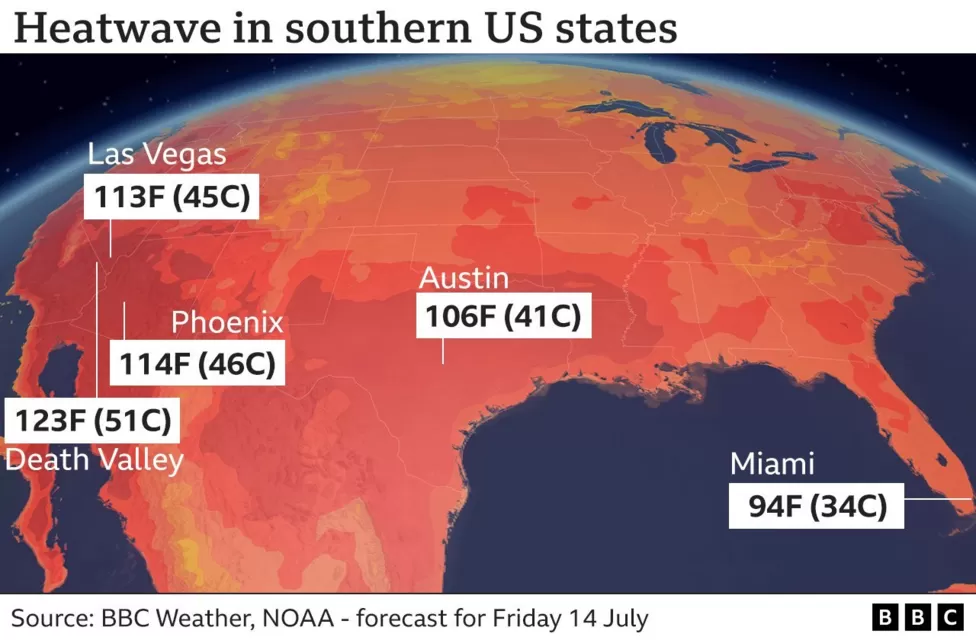US heatwave: A third of Americans under extreme heatwave

Across the south-west of the country, a blistering heatwave is forecast to intensify this weekend.
At least 113 million Americans were affected by heat advisories late on Friday, from Florida to Texas to California to Washington.
The amount of power consumed by air conditioners in Texas has surpassed the previous record.
In the next few days, temperatures are expected to exceed 110F (43C) for around 27 million people.
As a result of an upper level ridge of high pressure, warmer temperatures are expected, according to the National Weather Service (NWS).
According to the agency, it is “one of the strongest” systems of its kind in the region.
The NWS said that the subtropical ridge responsible for this likely historic heatwave is not showing signs of letting up anytime soon.
According to the Centers for Disease Control and Prevention, approximately 700 Americans die from heat-related causes every year.
Why this summer has been so hot – the new normal
How do heatwaves affect the body?
It will also be exceptionally hot on Saturday, with daytime highs expected to reach up to 115F (46C) in some areas. It is expected that the scorching heat will last until next week.

With 110F (43C) forecast for the next five days, Phoenix is on course to break its longest hot spell record.
There have been 15 days with temperatures over 110F in the city already, which is the city’s all-time record.
During the next few days, Las Vegas may surpass its official all-time high temperature of 117F (47C), while Death Valley, California could eclipse its official all-time high of 130F (54C).
It is “not your typical desert heat,” warns the NWS in Las Vegas to those who may think they can handle the temperatures.
‘It’s the desert, of course it’s hot’ This is a dangerous mind-set! This heat wave is not typical desert heat due to its long duration, extreme daytime temperatures, and warm nights. Everyone should take this heat seriously, even those living in the desert.”
The south-west US has already experienced intensely hot temperatures over the past week. For 27 consecutive days, El Paso, Texas, has experienced triple-digit temperatures.
There have been closures or shortened hours at parks, museums, zoos and businesses due to the extreme heat.
Bison Cafe in Quitaque, Texas, cut its hours due to scorching temperatures, saying the kitchen was “very uncomfortable.”
As a result of the heat, hospitals saw an increase in admissions.
Heat-related illnesses are on the rise now, including dehydration and heat exhaustion, said Dr Ashkan Morim, who works in the emergency room at Dignity Health Siena Hospital outside Las Vegas.
The temperatures overnight were expected to remain “abnormally warm” in some areas, offering little relief from the heat at night.
The heat has caused Texas’ power demand to exceed record levels two days in a row.
According to the Electric Reliability Council of Texas (ECROT), which manages 90% of Texas’ power load, Thursday’s usage exceeded Wednesday’s record of 81,351 megawatts.
Despite the agency saying it has enough resources to meet Friday’s demand, ERCOT expects power usage to surpass those figures.
Greece closed one of its major tourist attractions, the Acropolis, on Friday because of similar searing conditions in the US.
A record-breaking heat wave is expected in Europe
Wildfires in Canada claim the life of a young firefighter
A global average temperature of 63F (17.23C) was recorded last week, the highest in recorded history.
Scientists say rising temperatures are caused by climate change and the naturally occurring weather pattern known as El Nio, which happens every three to seven years.
Climate change will continue unless governments around the world cut emissions by a steep margin. The world has already warmed by about 1.1C since the industrial era began.
